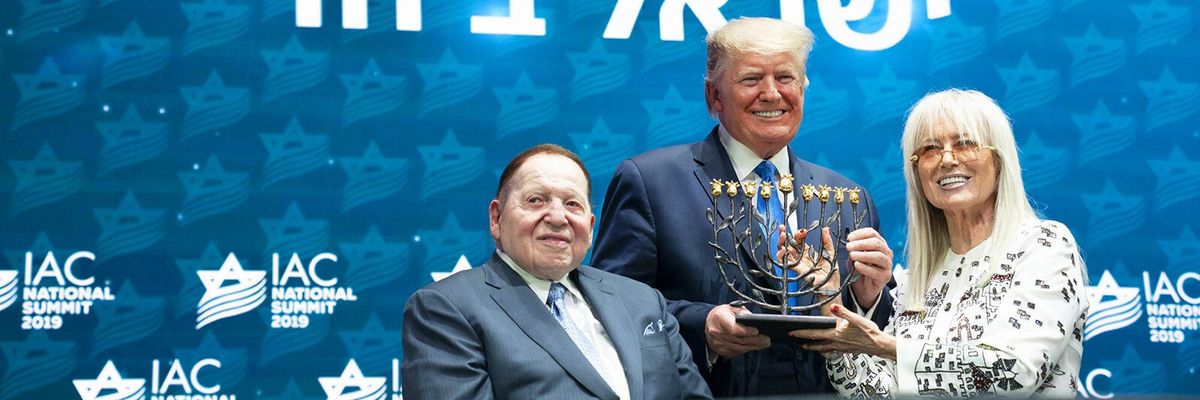Sheldon Adelson, the Republican Party’s biggest funder over the past decade, used a $20 million donation to a super PAC to pressure then-president Donald Trump to adopt the highly controversial decision to move the U.S. embassy in Israel from Tel Aviv to Jerusalem. That quid-pro-quo is described in New York Times journalist Maggie Haberman’s new book, “Confidence Man: The Making of Donald Trump and the Breaking of America.”
“Adelson’s singular focus was Israel,” wrote Haberman, effectively acknowledging that the former president’s biggest funder was most interested in promoting the interests of a foreign country.
“[In] Trump he saw a chance at enacting change in American policy toward [Israel], and gave $20 million to a super PAC working to elect him,” wrote Haberman. “As a candidate, Trump promised that he would open an embassy in Jerusalem ‘fairly quickly,’ and after his victory, Adelson pushed him to act on it. Over meetings during the transition and first year of the administration, Adelson assured Trump that the nightmare scenarios that he would be warned about in briefings as a possibility following such a move were overblown.”
Haberman goes on to detail how Trump appointed his bankruptcy lawyer David Friedman as ambassador to Israel and worked with his son-in-law Jared Kushner to “shift the U.S. approach to the region.”
“He and Kushner, ignoring concerns about treating Palestinians as if they were on equal footing with Israel in pursuing peace, pushed through a string of measures, such as slashing financial aid to Palestinians, forcing the Palestine Liberation Organization from its Washington offices, and the embassy relocation,” she wrote.
Recognition of the role played by Adelson’s campaign contribution apparently went all the way to the top of the Israeli government, according to Haberman,” who reports, “A confidant to Israel’s prime minister credited ‘David Friedman’s brains, Sheldon Adelson’s money, and Trump’s balls’” for the embassy move.
The relocation resulted in protests where 58 Palestinians were killed in protests and 2,700 injured.
While a highly controversial decision that calls into question the U.S. commitment to a two-state-solution with Jerusalem as the shared capital of Israel and a future Palestinian state, the Biden administration declined to reverse the policy shift allegedly made possible by Adelson’s $20 million contribution to a pro-Trump super PAC. Last year, the Democratic controlled Senate voted 97-to-3 in favor of an amendment supporting the embassy relocation.
Sheldon Adelson died early last year but not before he and his wife Miriam Adelson flaunted their influence by ferrying Jonathan Pollard — a former U.S. Navy analyst who spent 30 years in prison after pleading guilty to spying for Israel — out of the country and to a hero’s welcome in Israel on one of the Adelsons’ private 737s after Pollard’s travel ban was lifted.
Miriam, who holds both U.S. and Israeli citizenship, and is worth $27 billion, continues to loom large as a potential GOP megafunder in the midterms and beyond, but she’s largely held back, thus far, from the level of political giving she engaged in alongside her husband.
Whether or not she chooses to reemerge as a bankroller of the Republican Party — and potentially a shaper of the party’s foreign policy in the Middle East — she enjoys souvenirs from the influence she and her husband appear to have held over the Trump administration on sensitive U.S. foreign policy decisions.
After the Adelsons invested $133 million in Trump’s 2016 presidential campaign efforts and Republican congressional campaigns Trump awarded Miriam the Presidential Medal of Freedom in 2018.
But an even more tangible trophy was revealed in the final weeks of the Trump presidency when the deep-pocketed supporters of the embassy put up a roadblock for the next president to reverse the move. The U.S. government sold the Adelsons the U.S. ambassador’s home in a suburb of Tel Aviv for $67 million.
















